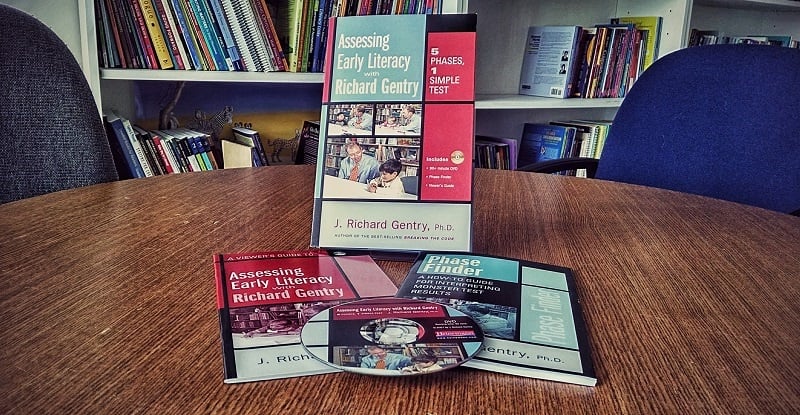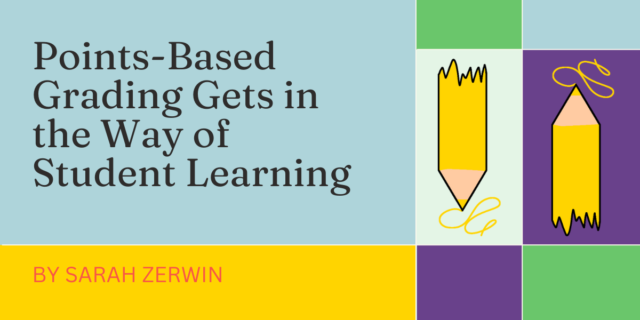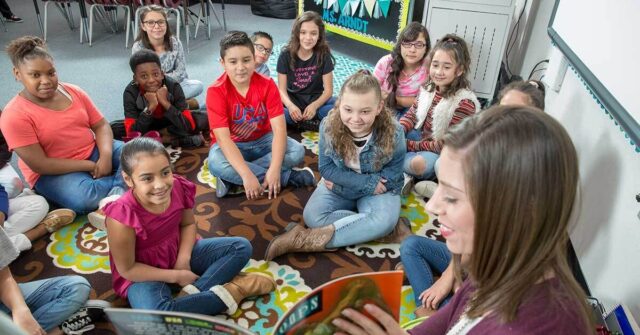Hear from an expert on Common Core kindergarten standards and developmentally appropriate expectations.

by Richard Gentry, PhD
Hey, kindergarten teachers, it’s test time again! Use your own teacher experience and expertise to show parents—or anyone—how a kindergartner’s reading brain is developing by answering one question: what phase on the five-phase pathway to code breaking is this kindergartner in today? Right now kindergarten kids are expected—at a minimum—to be in phase 2. So here’s a time-tested phase 2 checklist—research-based, easy-to-use, and understandable to parents. Complete the checklist in less than three minutes for each child, identify that child’s phase, and show whether he or she is below, on, or beyond the expected phase for this time of year in kindergarten.
This powerful formative assessment based on what you have already observed makes sense to parents and shows them what essential, basic literacy skill (“phase by-products”) their child can or cannot do—right now in kindergarten—plus what’s expected before the end of this year. I’ll also show you how to link the checklist to Common Core or comparable kindergarten state standards in ways that parents understand.
Step 1: Tell parents how the five-phase pathway works and link phases to Common Core kindergarten standards.
Teacher Talk: Common Core State Standards for kindergarten are spiraling, grade-by-grade, build-on-what-students-already-know expectations. The five-phase observation shows what your child already knows about literacy so it’s ideally suited for assessing Common Core expectations: it shows what your child can currently do as a reader, writer, and speller—the known skills we are building on in kindergarten. By building on these known skills we will move your child up to the next phase.
The phase your child is in closely parallels his or her reading brain architecture and development. That is to say, phase observation is a developmental gauge of how a child’s reading brain is developing based on what he or she can or cannot do.
Today we will look at how your child is progressing with phase 2 expectations—the minimal expectations for this time of year in kindergarten. Your child is expected to demonstrate the ten skills below by the end of the school year.
Step 2: Fill out the checklist and show it to parents.
Teacher Talk: Here’s the Phase 2 Expectations Checklist.
Phase 2 Expectations Checklist
As a reader your child can:
- Read words on sight (examples: word wall words, classmate’s names, family names, labels and signs).
- Use the beginning letter or other known letters in words to read (cue) some words (partial phonemic awareness).
- Read level B to C emergent texts with purpose, fluency, and understanding. (Show samples of texts being read independently after practice. Include child-selected samples from the child’s book bag and samples from guided reading.)
As a writer your child can:
- Write little informational, narrative, and opinion compositions with a mix of invented and a few conventional spellings.
- Demonstrate some letter-sound correspondences when producing drawings and meaningful texts.
- Create meaningful independent compositions such as R U DF for Are you deaf?
- Read back her own writing in Standard English when short pieces are transcribed by the teacher and practiced over and over by the student. (Show examples of stories you have “published” by transcribing the child’s writing and pasting it under the child’s original “kid writing.”)
- Begin to use a few conventions such as appropriate capitalization, grammatical usage, and punctuation. (Show examples from the writer’s portfolio.)
As a speller your child can:
- Spell some high-frequency kindergarten-level spelling words correctly. (Show examples of spelling words you have taught.)
- Invent spellings of many unknown words with close letter-sound matches making them readable. (Show pictures and examples from AEL, pages 24 and 25.)
Many kindergartners have moved beyond these minimal kindergarten expectations. In some schools and districts where standards are established locally, kindergartners are expected to enter first-grade phases.
What about the 5-Phase Pathway to Literacy and Common Core?
Let's face it. Teachers love phase observation. Heinemann has had a surge of requests for Assessing Early Literacy with Richard Gentry: 5 Phases, 1 Simple Test (a three-part, DVD-based kit with videos of children that make the phases come alive).
♦ ♦ ♦ ♦

Richard Gentry, Ph.D., has authored multiple books and a video with Heinemann, including My Kid Can't Spell (1996), Teaching Kids to Spell (1992), The Science of Spelling (2004), and Assessing Early Literacy (2007) as well as numerous articles in academic journals and textbooks for school-age children.


